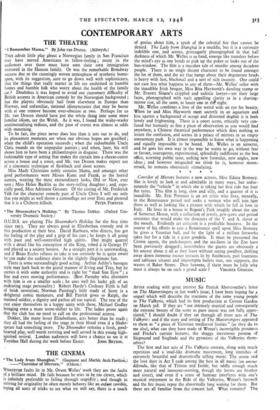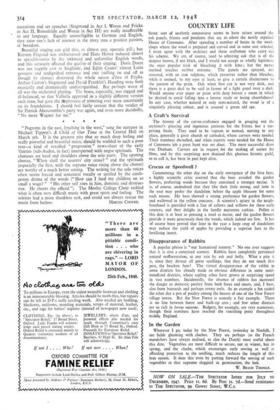MUSIC
AFTER reading with great interest Sir Patrick Abercrombie's letter on The Mastersingers in last week's issue, I have been hoping for a sequel which will describe the reactions of the same young people to The Valkyrie,- which had its first production at Covent Garden on March 3rd. If they are " not intensely musical and consequently the extreme beauty of the score as pure music was not fully appre- ciated," I should doubt if they sat through all three acts of The Valkyrie:- and if the story and setting of The Mastersingers appeared to them as " a piece of Victorian mediaeval fustian " (as they do to me also), what can they have made of Wotan's incorrigible prosiness and Fricka's curtain lectures, the shaggy incestuous passion of Siegmund and Sieglinde and the gyrations of the Valkyries them- selves?
The first and last acts of The Valkyrie contain, along with much repetition and a 'snail-like dramatic movement, long stretches of extremely beautiful and dramatically telling music. The storm and the love duet in Act I rank among the best in all music (an amour defendu, like that of Tristan and- Isolde, but oddly enough much more natural and innocent-seeming, though the lovers are brother and sister), and even if a sense of humour interferes with one's musical enjoyment in the Ride of the Valkyries, Wotan's farewell and the fire music repay the abnormally long waiting for them. But these are- all familiar from- the concert hall. What remains? Thq narrations and set .speeches (Siegmund in Act I, Wotan and Fricka in Act II, Briinnhilde and Wotan in Act III) are really insufferable in any language. Equally unintelligible in German and English, they raise one's lack of interest in the story into a positive passion,
of boredom.
Beautiful singing can gild this, as almost any, operatic pill ; but Kirsten Flagstad was embarrassed and Hans Hotter reduced almost to speechlessness by the awkward and unfamiliar English words, and this seriously affected the quality of their singing. Doris Doree was not happily cast as Sieglinde, and Edith Coates' almost Latin gestures and undignified entrance and exit (sidling on and off as though by chance) destroyed the whole raison d'être of Fricka. Arthur Carron's Siegmund and David Franklin's Hunding were both musically and dramatically undistinguished. But perhaps worst of all was the orchestral playing. The brass, especially,, was ragged and ill-balanced, so that Valhalla appeared in a slightly different version each time, but gave the Nnpression of tottering ever more uncertainly on its foundations. I should feel fairly certain that the verdict of Sir Patrick Abercrombie's party was again, and even more decidedly, " No more Wagner for me."
* * *
" Pogroms in the east, lynching in the west," sang the narrator in Michael Tippett's A Child of Our Time at the Central Hall on March 5th. It is the greatest pity that so much deep feeling and really powerful and beautiful music should be wedded to such a poor text—a kind of versified " progressive " news-sheet of the early 'thirties (sub-Auden, in fact) interspersed with negro spirituals. The choruses are head and shoulders above the solo parts. The opening chorus, " When shall the usurers' city cease? " and the spirituals (especially the first, with the soprano voice rising above the chorus) are worthy of a much better setting. The writing for the solo voices often seems forced and unnatural vocally or spoiled by the catch- penny drama of the words (" How can I feed my children on so small a wage? " " His other self rises in him, demonic and destruc- tive. He shoots the official "). The Morley College Choir tackled what is often very difficult music with great spirit and feeling. The soloists had a more thankless task, and could not -always rescue the



































 Previous page
Previous page